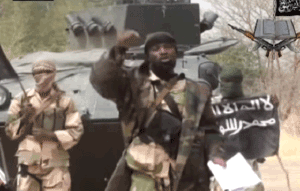Senior Correspondent, ISHAYA IBRAHIM, digs into Boko Haram’s sources of fundS, weapons and membership, and examines how the insurgency could be contained
Each time the Boko Haram leader, Abubakar Shekau, releases his online videos, the regular features are his demonstration of invincibility, exhibition of armoured tanks and other combat vehicles in his kitty, and defiant declaration of the Nigerian Army lacking the capacity to stop him and his men.
Boko Haram leader, Abubakar Shekau, with Amoured Personnel Carrier
His group has, in some ways, lived up to the boastful act, the height of which was the mass abduction of nearly 300 school girls at the Government Girls Secondary School, Chibok, Borno State, on April 14 this year. They followed up the abduction with series of attacks on both military and civilian targets. For instance, on May 18, a Boko Haram suicide bomber killed five people, including himself, in Sabon Gari area of Kano State.
On May 20, less than 48 hours after the Kano blast, the group also killed another 118 people at a busy market in Jos, Plateau State.
The following day, the terrorists took their belligerence a step further in Ashigashiya and Chinene villages, both in Gwoza local government area of Borno State. There, they sacked the entire village, killing as many as 19 people. The sect members also hoisted their flags in the ravaged villages.
On June 9, the group abducted another 20 women in Rigan Fulani village, a few kilometres from Chibok, the area where it had abducted nearly 300 schoolgirls earlier. These attacks have been ferocious, with reports indicating that the terrorists have killed more than 5,000 persons in the last five months.
“My worry as a security person is, why Boko Haram is having a field day. On June 9, 2014, we got to know that they had abducted another 20 women in a state where there is a state of emergency,” a security expert and a retired Commissioner of Police, Frank Odita, lamented.
Though the military has often claimed that it is winning the war against Boko Haram, Odita thinks the facts on the ground negate the claim. “So, the question I want to ask those who are in charge of our security is, how is it possible for these people to be having a field day in a state of emergency where the military should have 10 to 15 metres check point at every nook and cranny.”
Odita said the military has become overwhelmed to the extent that Boko Haram is now having a field day.
“They come and abduct women; they kill people everyday; and our military are not responding. We have not been told how many casualty they (Boko Haram) have suffered as a result of encounter with our military. If they (military) are killing them, I am sure Boko Haram will not be coming. They (Boko Haram) just come and go, carry girls, carry food, now they are crying women. We don’t know what they will carry next. It is becoming embarrassing,” he said.
What went wrong?
“The first mistake that was made by us is that we removed our first and second line of defence and applied the third,” Odita said, explaining the deteriorating state of insecurity in the country. “What I mean is that internal security is the business of police; it’s not a military business. It is only when the police have exhausted their effort and their mobile cannot cope, then the military can come as the final assault.”
He said the military is not trained to maintain internal security, but to wage war against another nation’s army who are becoming aggressive to Nigeria.
“And you can see what is happening now. Every agency is flaunting itself. The SSS (State Security Service) that is supposed to work like CIA, like MI5, who are not seen or heard, are now parading criminals; they are now giving press conferences,” he said.
Odita regretted that the main internal security operators, which are the police, are relegated to the background, something he sees as an aberration to effective policing.
“The SSS are supposed to get information and inform the police where the people are. Police go there and carry out arrest. Where they cannot carry out arrest because of the fire power of the people, then the military can come in. That is, after the Mobile Force has failed,” Odita explained.
Arms and ammunition
The Independent, a United Kingdom newspaper, revealed in its June 7 edition that the Boko Haram terrorist group has, in its armoury, a seemingly limitless amount of heavy weaponry, vehicles, bombs and ammunition. Among the weapons believed to be in the hands of the terrorists are rocket launchers, Armoured Personnel Carriers (APCs), mortars, assault rifles including AK47, machine guns, pump actions and many others.
The terrorists also appear to be skilful in the art of making improvised explosive devices (IEDs) and petrol bombs.
According to Odita, the international connection of Boko Haram makes it easy for it to access all kinds of weapons.
“As much as you know, Boko Haram is no longer a Nigerian subject matter. They have gone international. We see them as an offshoot of Al-Qaeda. So, they have sponsorship, but from where we cannot lay our fingers on, they have sponsorship that is strong enough to give them the kind of weapons they are using,” he said.
Dr. Tunde Oseni, an expert in international relations, said Boko Haram, like other groups that make use of arms and ammunition, has network of contacts that supplies it weapons.
“You understand that some individuals are actually licensed by law to carry out arms business. But Boko Haram gets its weapons through illegal importation,” he noted.
A retired army major, Shankara Ibrahim, adds another dimension to the sources of Boko Haram’s arms acquisition. For him, the insurgents could also be harvesting weapons from attacks they launched on military formations, like the one on Air Force base and Giwa Barracks, all in Maiduguri, Borno State.
Sources of fund
Concerned Nigerians have always asked where Boko Haram gets funding to acquire such expensive military equipment which it uses in its campaign of slaughter. The Independent in the UK, quoting a survey of academic, governmental and journalistic accounts, said Boko Haram funds its escalating acts of terror through black market dealings, local and international benefactors, and links to Al-Qaeda and other well-funded groups in the Middle East.
The newspaper, citing another report of the International Crisis Group (ICG), recalled that Boko Haram’s fund-raising began after the 2001 terrorist attacks on the 110-storey World Trade Centre (WTC) building and the Pentagon.
It said in 2002 when Mohammed Yusuf founded the group, that the late Osama bin Laden had around that time sent an aide to Nigeria with about £1.8 million to dispense among groups that shared Al-Qaeda’s mission to impose Islamic rule across the globe. According to the ICG, one of the “major beneficiaries” of the funding was Boko Haram.
The report added that the connection between Boko Haram and Al-Qaeda – and its money – deepened when Yusuf fled to Saudi Arabia to escape one of Nigeria’s first crackdowns on the terrorist group.
EJ Hogendoorn, the ICG deputy programme director for Africa, and an author of the report, told The Daily Beast, a sister publication of Newsweek magazine: “What I can tell you from talking to lots of conservative Muslims in Nigeria is that there was a lot of money coming into Northern Nigeria. There are many sources of that money. One of those sources was from Al-Qaeda.”
Another analyst, Heather Murdock, writing for the Voice of America (VOA), said the fund-raising apparatus of Boko Haram is intricate and opaque, stressing: “The actual source of the funding is as elusive as the militants themselves.”
Boko Haram also reportedly gets cash from Islamic terrorist groups such as al-Shabaab in Somalia, local Al-Qaeda affiliates, as well as kidnapping for ransom.
A group, Combating Terrorism Centre at West Point, the U.S. military academy, said: “Kidnapping has become one of Boko Haram’s primary funding sources, a way to extract concessions from the Nigerian state and other governments, and a threat to foreigners and Nigeria’s government officials.
The centre estimated that Boko Haram kidnapping was worth “millions of dollars in ransom money”.
Last year, Boko Haram was believed to have secured $3 million in exchange for a French family of seven it seized in northern Cameroun.
For Oseni, it is difficult to pinpoint the particular sources of funding to the insurgents.
“Some individuals have been identified to be giving some indirect support, but you don’t have full facts. Because Boko Haram is both local and international, it is likely that they have both internal and external sponsors, and these sponsors are their sympathisers or individuals who benefit from their activities directly or indirectly,” he said.
Odita believes that the sources of Boko Haram’s funds are shrouded in secrecy. “Boko Haram is no longer a Nigerian subject matter. It has gone international. We see it as an offshoot of Al-Qaeda. But they have sponsorship that is strong enough to give them the kind of weapons they are using,” he said.
Membership
Oseni said the membership of the group has been enlarged from the usual local uneducated recruits in the North to include network of international terror organisations.
“It is beyond the recruitment of poor, uneducated almajiri (itinerant Islamic students). It has moved from that to include international collaborators who enrol in Chad, in Niger and probably part of Mali and Sudan,” he said.
The terrorists are also believed to be hypnotising and conscripting young people to swell their ranks. Spokesman of the 7 Division, Nigerian Army, Col. Muhammadu Dole, had in a chat with journalists in December 2013, revealed that Boko Haram terrorists move around villages and other highways to abduct and forcefully recruit innocent people to replace their members who get killed by Nigerian troops.
Containing the enemy
Boko Haram is believed to be having shortage of food; hence it has been attacking villages and stealing foodstuff. For Odita, this presents an opportunity for the security agencies to leverage on.
“Hunger is a weapon of war. If we can starve them (Boko Haram members) of food, then of course it will ameliorate the problem because if you don’t eat, you can’t fight.
“That is how Nigeria won the Nigeria-Biafra war because they starved the Biafrans of food supplies. And because it was not possible for people to be starving and fighting, they came out and said ‘enough is enough – we can’t die of hunger,” Odita said.
On his part, a retired army captain and security consultant, Aliyu Umar, told the VOA that cutting the funding of Boko Haram remains the only strategy in defeating the insurgents. “Funding of Boko Haram is quite a very crucial question. If we can get to the bottom of that, then we can cut off the source of the funds,” he said.
By the close of last week, not much had been gathered in the efforts of the Nigerian government or the military in containing the insurgents. At the height of the furore trailing the abduction of the Chibok school girls, the country had reached out to America, France, China, Britain and Israel as part of efforts towards checking the activities of the sect. Hopes were then raised that with the involvement of the countries, the days of Boko Haram menace were numbered. Not much appears to have been recorded in this respect. But officials of the government have regularly assured that they are on top of the situation.














